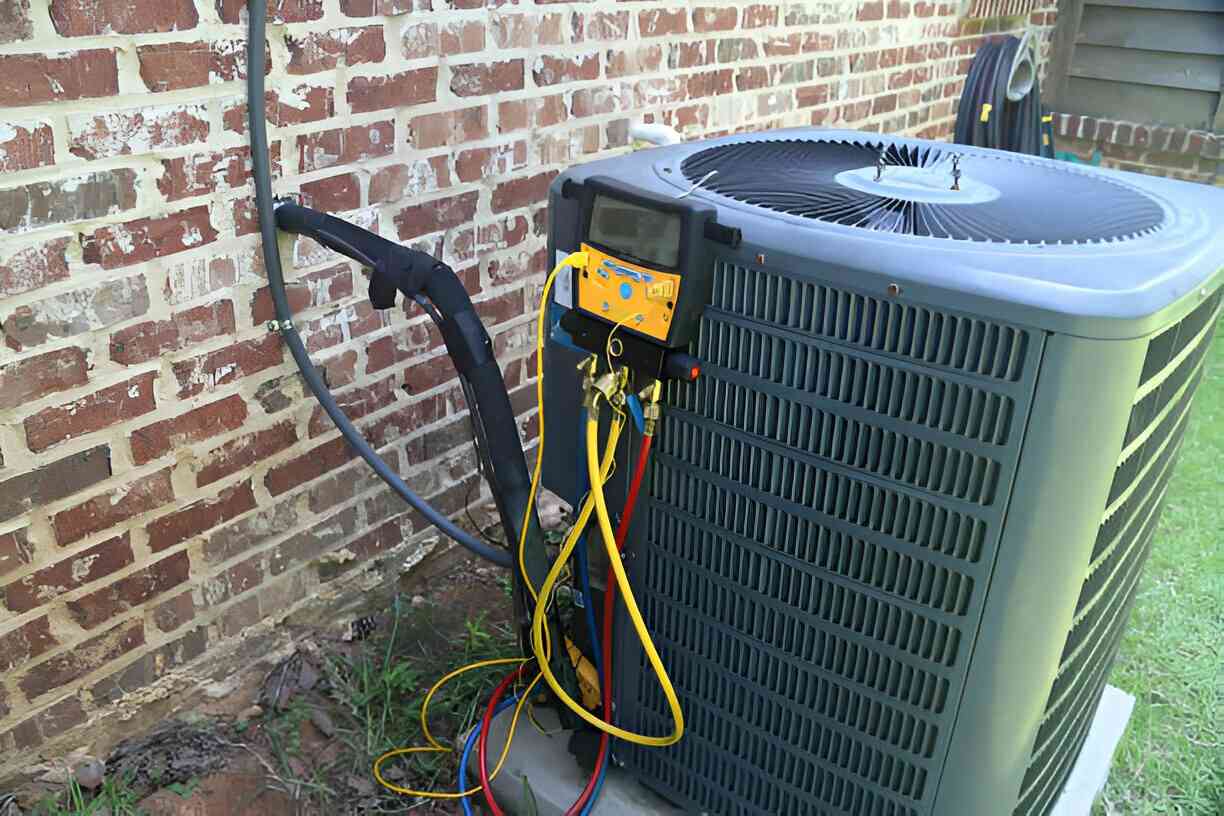AC Maintenance in Spring Hill, FL


Why seasonal AC maintenance matters in Spring Hill, FL
Spring Hill’s subtropical climate means AC systems run more hours than in many other regions. That increased runtime accelerates wear on mechanical parts, shortens equipment life, and increases the chance of refrigerant loss or electrical failures. High humidity also encourages coil corrosion and biofilm growth on evaporator coils and drain pans, which reduces efficiency and contributes to indoor air quality issues. Salt-laden air near the coast can corrode outdoor unit fins, motors, and electrical connections. Regular professional maintenance addresses these factors proactively.
Common AC maintenance issues in Spring Hill, FL
- Reduced airflow from dirty filters, clogged coils, or partially blocked ductwork—common with heavy pollen seasons.
- Frozen evaporator coils caused by restricted airflow or low refrigerant.
- Refrigerant leaks or low charge, especially in older systems or units still on R-22 refrigerant.
- Corroded outdoor components (fins, fan motors, contactors) from salt air exposure.
- Clogged condensate drains and pans, leading to water overflow, mold growth, and safety switch trips.
- Worn electrical components such as capacitors and contactors after heavy seasonal use.
- Thermostat and control issues causing short cycling or inaccurate temperature control.
What a professional AC maintenance visit includes
A comprehensive tune-up focuses on safety, efficiency, and identifying problems before they escalate. Typical steps include:
- System performance check: Verify runtime, temperature splits, and overall cooling performance to confirm the unit meets expected output.
- Filter inspection and replacement guidance: Evaluate filter type and condition and replace or recommend the correct replacement frequency for Spring Hill conditions.
- Coil cleaning: Clean evaporator and condenser coils to restore heat transfer efficiency; biofilm and salt build-up are addressed.
- Refrigerant level check: Measure refrigerant pressures and temperatures to detect leaks or undercharge, and recommend repair or recharge if necessary.
- Electrical and safety inspection: Test capacitors, contactors, wiring, and safety switches for wear or potential failure.
- Fan, blower, and motor check: Lubricate bearings if applicable, inspect belts, and ensure balanced fans for optimal airflow.
- Condensate drain and pan service: Clear blockages, sanitize the pan if needed, and verify the drain lines are flowing properly to prevent backups and mold.
- Thermostat calibration: Confirm accurate temperature readings and thermostat operation; suggest upgrades for better control if appropriate.
- Outdoor unit inspection and protection: Look for corrosion, straighten fins, and assess mounting for storm or hurricane readiness.
Diagnostic detail made simple
Technicians use straightforward diagnostic tests to know what’s wrong and why. They measure the temperature difference between return and supply air to confirm airflow and heat transfer performance. Refrigerant gauges and temperature readings tell whether the refrigerant charge is correct or whether a leak exists. Electrical tests reveal weak capacitors or worn contactors that cause hard starts. All findings are explained in plain language, prioritizing safety and cost-effective options such as targeted repairs versus full component replacement.
Maintenance schedule recommendations for Spring Hill homes
- Filters: Inspect every 1 month; replace every 1–3 months depending on filter type, household allergens, and pets. High-efficiency or pleated filters may require more frequent checks in pollen-heavy seasons.
- Tune-ups: Twice a year is ideal—spring before heavy cooling and fall to prepare for milder use—because Florida’s long cooling season stresses components year-round.
- Coil cleaning and condensate service: At least once a year, more frequently if you notice reduced cooling or persistent humidity issues.
- Refrigerant and electrical checks: Annually, or immediately if performance drops or the unit cycles poorly.
- Post-storm inspections: After significant storms or hurricanes, inspect outdoor units for physical damage and electrical safety.
Maintenance plan options (what to expect)
Maintenance plans are typically structured to match different homeowner needs and equipment conditions. Below are common plan tiers and what each prioritizes:
Basic Care Plan
- Annual or biannual tune-up
- Filter inspection and replacement discount
- Priority scheduling windows for maintenance visits
Standard Protection Plan
- Two tune-ups per year (spring and fall)
- Coil and condensate drain service included
- Refrigerant and performance checks
- Reduced rates on repairs and parts
Comprehensive Comfort Plan
- All Standard Protection services plus seasonal filter supply options
- Priority emergency service scheduling
- Extended diagnostics for complex issues and components cover at service rates
- Corrosion inspection and recommendations for coastal-suitable protection
Each plan emphasizes preventative care, documented service history for warranty compliance, and predictable maintenance timing to reduce unexpected failures.
Benefits of preventative AC maintenance
- Lower energy bills: Clean coils, proper refrigerant charge, and good airflow reduce runtime and electrical draw.
- Longer equipment life: Regular lubrication, tightened connections, and early repairs reduce wear, extending system lifespan.
- Fewer emergency repairs: Routine inspections catch problems when they are less expensive and easier to fix.
- Improved comfort and air quality: Proper humidity control, clean coils, and fresh filters mean more consistent temperatures and fewer allergens indoors.
- Compliance with warranties: Manufacturer warranties often require documented maintenance to remain valid.
Tips for Spring Hill homeowners between service visits
- Replace or check filters monthly during high pollen and summer months.
- Keep the area around the outdoor unit clear of plants, debris, and yard equipment to ensure proper airflow and reduce corrosion risk.
- Watch for early warning signs: unusual noises, increased energy bills, weak airflow, or frequent cycling. Document these to share with a technician.
- Consider a corrosion-resistant coating or sacrificial anode options for units closer to the coast to combat salt-air damage.
- Schedule a post-storm inspection to verify the unit’s electrical safety and physical condition.
Regular AC maintenance in Spring Hill, FL protects comfort, reduces energy costs, and prevents the stress of unexpected failures during the hottest months. A strategic maintenance schedule and an appropriate plan tailored to local climate conditions will keep your system running efficiently and reliably year after year.
Service Areas


